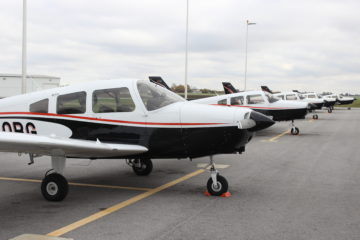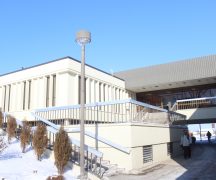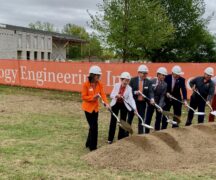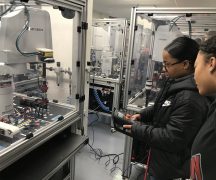By DAVID DUPONT
BG Independent News
Aviation at Bowling Green State University is flying high.
Jennie Gallimore, the dean of the College of Technology, Architecture and Applied Engineering, (http://bgindependentmedia.org/bgsu-taps-wright-state-educator-jennie-gallimore-as-dean-of-college-of-technology-architecture-applied-engineering/) said the program in Flight Technology Operations is nearing capacity, even with the construction of a new hangar and purchase of more planes.
The number of students enrolled in the pilot-training program has more than doubled from 2016 when there were 159 students to 2018 with 379 students. And a couple hundred students were accepted into the program as of a month ago, though it’s uncertain how many would enroll.
Much of this is driven, she said, by both a shortage of pilots and “an extreme” shortage flight instructors. BGSU develops its own corps of instructors, but that takes time.
All this has been driven by the 2014 partnership BGSU signed on with North Star Aviation to provide flight training for aviation technology students.

Growth is not as robust in BGSU’s aviation management degree program. That trains the many support people in the field. Pilots need support. She said the number of jobs is “massive,” in safety, airport management, flight dispatch and related areas.
While the shortage of pilots makes the news, the need for these support positions is not as well reported.
North Star, Gallimore said, has advertised heavily for the flight program. BGSU hasn’t pushed the management program as hard. So there’s room for growth.
Gallimore believes the university’s move to get accredited by the Aviation Accreditation Board International next year will bolster its profile.
“I believe it will help aviation management grow,” she said.
A third aviation degree program within the college, aviation engineering technology, has been grounded as of this year. Those students in the program will be able to complete it, but no new students will be admitted. This fall’s class will be the last cohort.
The program, Gallimore said, is out of synch with the field. Students studied engineering technology and then took aviation courses, but didn’t take courses specifically in aviation technology.
The program, she said, is being reworked, with the possibility that it would shift its focus to safety. “We decided to move into a new direction.”
Gallimore, who was hired as dean a year ago, brings the right background to help pilot a college that houses aviation degree programs.
With degrees in industrial engineering and operations research, she specialized in human factors engineering. At the beginning of her academic career at Wright State University, she did research for the Navy in pilot spatial disorientation.
While pursuing that research, she decided to learn to fly and got her private pilot’s license. “I was really doing it from a research perspective.”
Gallimore continued to do aviation-related research for the Navy, Air Force, and Federal Aviation Administration including in the design of displays in the cockpit.
Some of this is related to the development of the next generation air space. This is a reimagining of the way aircraft now operate in the air. Pilots will rely more on satellite data, rather than guidance from air traffic controllers on the ground. “The idea of voice control would go away. That would be for emergencies,” Gallimore said.
This freer, though still controlled, flight will be more efficient, allowing more planes to land and guiding them to the best routes. This would cut costs and reduce the time planes are in the air.
“That’s what’s driving a lot of things in aviation,” Gallimore said. “These concepts change the way flight occurs now in the national air space.”
This is a seminal change requiring the development of new algorithms and technologies, including data communications, she said. That leads to more job opportunities with the companies that will design the planes and rework the logistics of flight.
Aviation students will be entering a field that is rapidly changing, she said. This especially concerns those in the aviation management program; those training to be pilots are most focused with what’s happening now, and how to keep up with changes as they occur.
To position students to take advantage of those opportunities will require the development of a masters program, Gallimore said.
Those students would then be able to do the research into the concepts that will help shape air travel in the travel.





